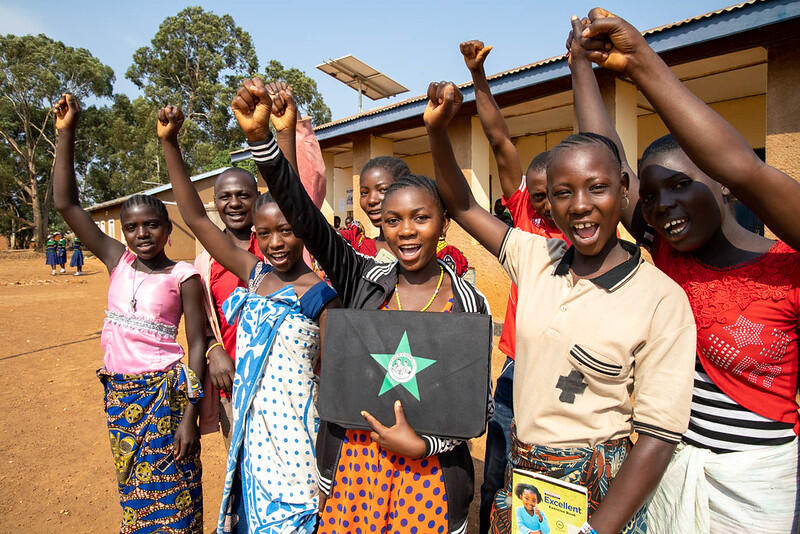JOINT STATEMENT
By COTLA, the Council of Traditional Leaders of Africa,
in association with UN Women and UNFPA
16 Days of Activism against Gender-Based Violence
On the occasion of the commencement of the 16 Days of Activism against Gender-Based Violence, the Council of Traditional Leaders of Africa (COTLA), in association with UN Women and United Nations Population Fund (UNFPA), reiterates its solidarity and commitment to promoting gender equality and to ending all forms of gender-based violence (GBV) against women and girls. We recognize our responsibility to use our authority and influence to shape attitudes and behaviour that ensure that women and girls can live in peace and security, free from discrimination and harm.
This year has been a challenging one for the people of Africa. The COVID-19 lockdowns with associated mobility restrictions have led to food shortages, unemployment, economic insecurity, school closures and an increase in GBV. Many have lost their livelihoods, which has increased stress levels for families, in particular women-headed households experiencing nutrition insecurity and the inability to access medical care, with reduced maternal check-ups.
As the world retreated inside homes due to the lockdown measures introduced to curb the COVID-19 pandemic, reports showed an alarming increase in the already existing pandemic of violence against women. We have been alarmed at the increase in violence against women and girls and its consequences. Intimate partner violence is on the rise and because of mobility restrictions, many survivors cannot access health services, counselling or police protection. Long-term closure of schools and tertiary institutions due to COVID-19 has interrupted education, exposing girls to a greater risk of GBV, child marriage, female genital mutilation (FGM), unintended pregnancies, and HIV infection with limited or no access to reproductive health services. The disruption of health services has prevented many women and girls from enjoying sexual and reproductive health and exercising their reproductive rights, limiting their access to critical services such as maternal health. Limited economic opportunities are likely to increase child labour and exploitation of women and girls, including sexual exploitation and abuse.
As COTLA members, we are not simply bystanders in this. Rather, traditional and religious leaders across the continent are active advocates for laws to end child marriage, FGM and other harmful practices. We have taken action to stop child marriage in our communities and we are champions of girls’ access to education. Since the launch of COTLA in 2019 supported by UN Women and under the auspices of His Excellency Edgar Lungu, President of Zambia, more than 157 chiefs have banned FGM. Religious leaders in some countries have issued decrees and by-laws to end FGM and child marriage.
But we know that we have so much more to do. Across Africa, 125 million girls and women alive today were married before their 18th birthday and one in ten before their 15th birthday. Recent data estimates that about 68 million girls will be at risk of FGM by 2030, if current levels of intervention remain in place. One in three women have experienced sexual violence by a non-intimate partner. Intimate partner violence, which is a feature of inequality between women and men, constrains the lives of too many women.
As COTLA, we join UN Women and UNFPA to endorse the theme of the 16 Days Campaign for 2020, which is Orange the World: Fund, Respond, Prevent, Collect! We are shining the spotlight on all forms of violence against women and girls.
We call on governments and the people of Africa to work with us to ensure adequate funding for essential services, including sexual and reproductive health services at community level. We call for more effective responses for survivors of GBV, including improved policing and judicial protection through the criminal justice system. And we are also recommending greater attention be paid to data collection on the prevalence of violence against women and girls, and the monitoring of improvements in GBV services and programmes.
It is critical that governments include GBV support services in their COVID-19 rapid response plans, and develop innovative strategies to protect women and girls from violence. We will continue to champion the prevention of GBV through campaigning for gender equality and building positive masculinities.
Much still needs to be done. Change is possible as long as we all hold each other accountable. In the words of COTLA’s Convener General, His Royal Majesty King Adedapo Aderemi, to: “break our silence, condemn in totality, stand against any form of violence and adopt zero tolerance of domestic violence, child marriage and female genital mutilation, which are modern forms of slavery, brutal crimes and inhuman indignities.”


